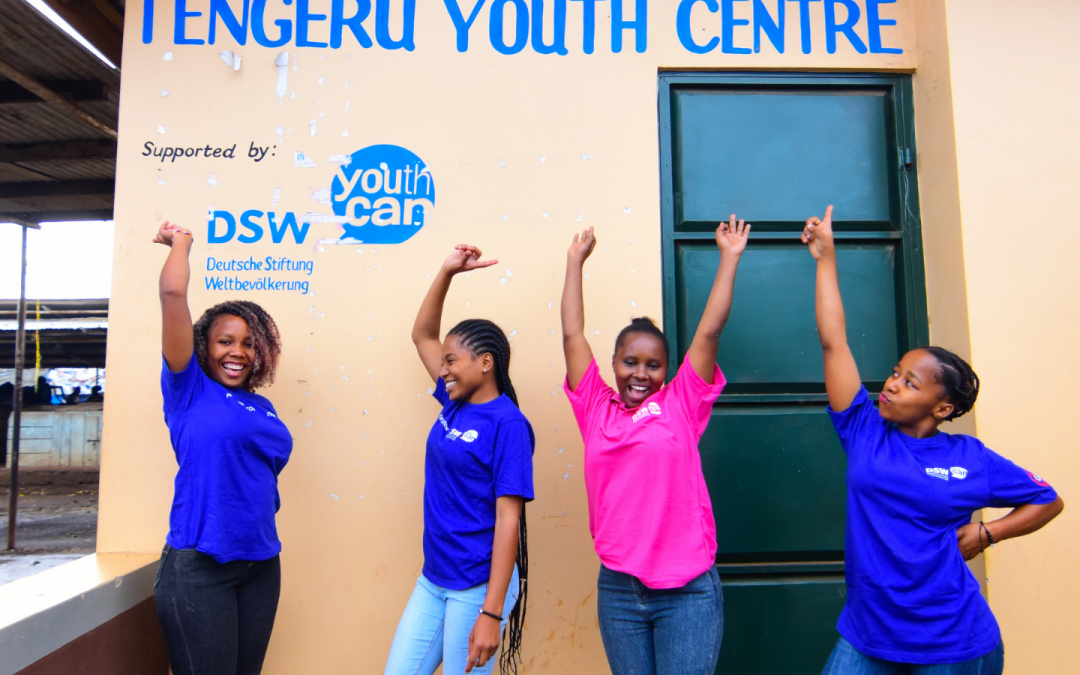Eight DSW Youth Champions will be using their voices this year to make sure the EU’s external action effectively responds to young people’s needs, particularly in the field of global health and sexual and reproductive health and rights. The Youth Champions are from Kenya, Uganda, Ethiopia, and Tanzania and are an integral part of DSW programmes in their countries and communities; empowering young people and promoting their rights.
We first heard from Jessy and Dorothy from Uganda, then Burnice and Kevin from Kenya, before Aynalem and Elsabet from Ethiopia. Last but by no means least are Habiba and Mwanaima from Tanzania. Let’s hear from them why they decided to become youth champions, and what change they’re wanting to create to address the challenges faced by youth in their community.
Mwanaima Mbaga is a 23-year-old Youth Champion from Tanga, in eastern Tanzania.
Mwanaima chose to become a youth champion as she was motivated by DSW activities to work with youth, especially on life skills, sexual reproductive health, and leadership. She explains more in this video:
Habiba Saidi Mtamba is a 23-year-old Youth Champion from the Songea region of Tanzania.
Habiba is very involved in community action and volunteerism, especially on issues related to health and the environment. She chose to become a DSW Youth Champion as it gave her more opportunities to highlight the challenges faced by her community, especially by young women and girls. Get to know more about her by watching this video:
What challenges are young people in Tanzania facing?
Mwanaima said, “One of the greatest challenges is that young people have no power, no voice in decision making, especially when it comes to sexual and reproductive health and rights. There are very few young leaders, and it’s difficult for young people to have their voices heard”.
Habiba added, “There are many challenges faced by young people, including drug abuse, early marriage and unintended pregnancies. For young women and girls especially, talking about menstruation hygiene is a complex issue. I believe every woman deserves the information and care to be able to manage their menstruation with dignity, but in Tanzania, there are still too many barriers, including a lack of understanding and limited access to pads and towels.”
“Teenage pregnancy is still a challenge faced by young girls in school, and as a result, they fail to accomplish their educational goals. This challenge has been exacerbated by the COVID-19 pandemic. Not only are young girls’ education goals under threat, but so is their health as a result of disruption in health care services!”, added Mwanaima.
What needs to be done to tackle these challenges?
Habiba said, “In terms of tackling unintended pregnancies, we need more education, more awareness-raising. Young people are unaware of their sexual and reproductive health and rights, and this needs to change in order for young people to fulfill their potential!
Cultural beliefs are also a barrier to tackling some of the challenges that young people face. Young people are made to think that they cannot, or shouldn’t know about family planning for example, but this is not true.”
Mwanaima added, “Increasing funds for sexual and reproductive health and rights services is really important, especially for improving and expanding youth-friendly corners, well-equipped spaces dedicated to young people, which have shown to be effective. I think it’s especially important to expand such services in rural areas so that young people have the knowledge and don’t lose hope!
Giving girls education on sexual and reproductive health is especially important, as it gives them the opportunity to know their health rights, where to report their challenges, setting their goals and plans, and focus on their ambitions for the future. Girls can be leaders, doctors, caretakers, or engineers. All of these are possible if they can walk towards their dreams healthily.
Important steps to achieving this include having more Members of Parliament and Government Officials that support youth-friendly policies and to increase the involvement of youth in budget making processes, especially on issues of health.”
She added, “Health is everything. If there is no health, nothing can be done.”
What role for the European Union?
We call on the EU to upscale its engagement with young people and youth groups, especially in relation to the EU-Africa partnership. Young people need to be part of those discussions, and need to be heard!
The EU should liaise with the government of Tanzania to make sure family planning is prioritised and commitments are implemented, to set the ground for the next generation to be empowered to make choices governing their own bodies and futures. This could be achieved by providing sexual and reproductive health training, improving life skills, and strengthening the provision of youth-friendly services, for example through the integration of youth-friendly corners and services into health facilities.
You can find out more about all eight youth champions here.

